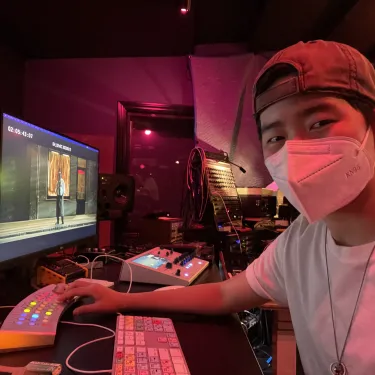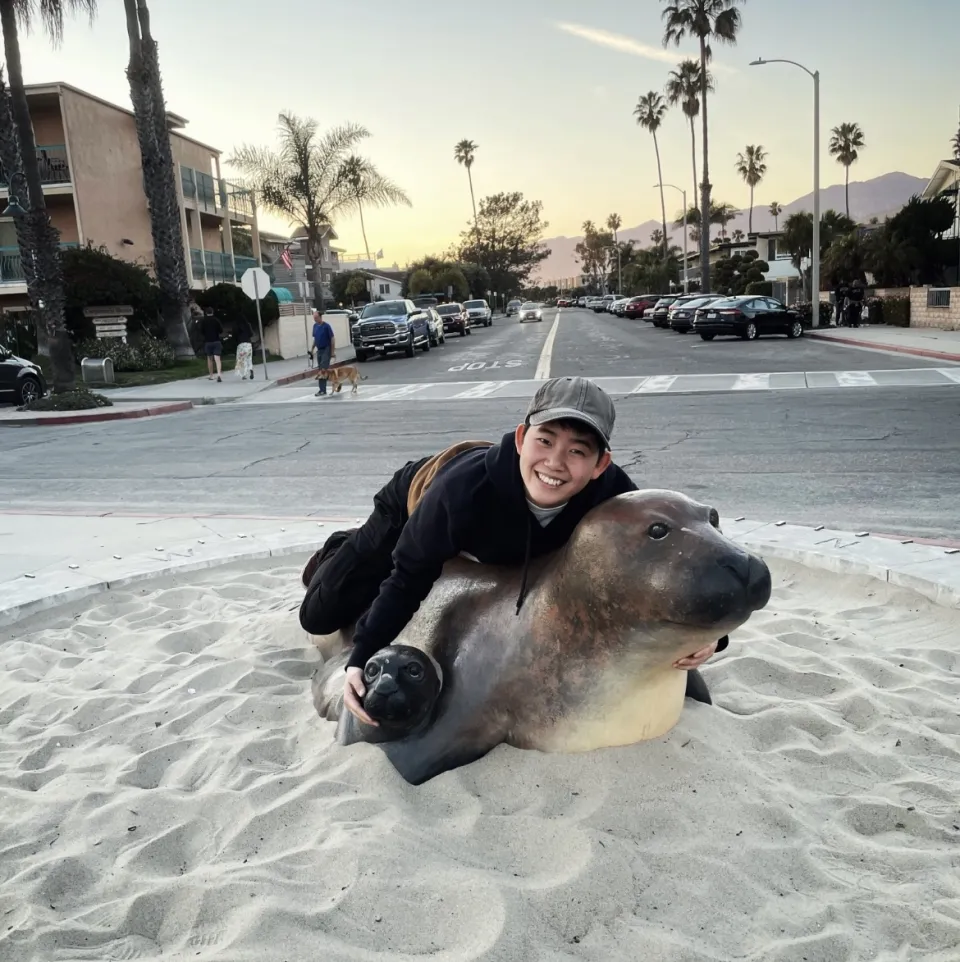Elie Ziehl ’24
Smithie Snapshots

Other clubs, sports, activities:
Smith College Rugby; Smith College Gamelan Ensemble
Describe your major for someone who has never heard of your field before.
The Film and Media Studies major is a broad, but pretty deep scoop into the pillars of academic analysis, production filmmaking, and screenwriting, and theoretical conceptualization of motion picture media, which includes live-action, animated, and motion captured formats of film, television, and video games.
Depending on the course, the curriculum often involves watching a lot of films over the course of the semester, reading academic publishings on the topic of academic analysis and theory, filmmaking production exercises, or drafting a screenplay. The music major spans Western music history and literature, composition and theory, ethnomusicology of non-Western cultures.
I’ve engaged in course readings, lectures, and discussions about canonical structures of Western music, music theory, techniques, and philosophies of music composition, racial and gender minorities in music history, philosophical questioning of the definition of music.
During my time at Smith, I’ve composed a handful of pieces for instruments like violin and cello, electric bass and reverb-delay machine pedal, flute and clarinet, and an electroacoustic track created entirely in a digital audio workstation. As part of the performance requirement for the major, I’ve taken piano lessons and participated in the Jazz and Javanese Gamelan ensembles at Smith.
My musical interests have always been pointed towards topics that the music department is currently working on offering in the coming years, which include music production with analog and digital synthesizers and audio engineering techniques of the 20th and 21st century.
If you could make everyone on the planet listen to one song all the way through, what would it be?
The evil part of me would suggest the Guinness World Record-breaking song by Dr. Jagadeesh Pillai in India that runs at 138 hr 41 min 20 sec, which was released on 12th April 2023. (The day before my birthday!). It’s based on the Hindu epic poem “Shri Ram charity Manas.”
What’s your all-time favorite Smith memory?
I spent two cold, dark nights in the forest along Mill River filming a horror picture for FMS 282 Advanced Production course. Despite all the preparation for filming, there were many moments of spontaneity or improvisation from the original script to the final picture. We could hear coyotes howling and beavers slapping their tails against the water, all while trying not to feel like we were in the start of our own Blair Witch horror story.
It’s been very rewarding to see how I’ve been able to create new pathways for academic study that weren’t offered in the original syllabus, pathways that explore identity representation for people like me who haven’t been featured widely on the silver screen.
You do work on both the production and analysis side of film studies. Could you speak to that work a bit and what you enjoy most about it?
At the start of my film studies career, the courses I took were academic-, lecture-, or colloquium- style courses where my areas of analysis were pretty broad, exploring general aspects of how filmmaking aspects like sound and music, cinematography, and mise-en-scene contribute meaning to a film.
As my scholarly interests in film studies matured, I began to explore aspects of race and gender in my analysis. I also began to indulge my fascination with horror and thriller genres when I took a Five College course “Psycho Thrillers” at UMass. It’s been very rewarding to see how I’ve been able to create new pathways for academic study that weren’t offered in the original syllabus, pathways that explore identity representation for people like me who haven’t been featured widely on the silver screen.
The latter half of my undergraduate career has focused on the production aspect of filmmaking and screenwriting, where I’ve directed two original horror pictures and an original abstract piece. I really enjoy the collaborative nature of the production courses, where I was able to work on and assist in the various narrative and documentary short films that my classmates were writing, directing, or producing. I’ve made some lasting connections in the film major this way.
Did you ever have trouble deciding on a major? What, ultimately, helped you decide?
As I was applying to colleges and touring Smith after my acceptance, I was unsure of what major to pursue, particularly since I’d come to the sudden realization that my previous commitment to medical school was more of a figment of childhood imagination and not what I wanted to dedicate the next formative years of my life to. I took a gap year to help me decide whether or not the film and entertainment industry was something I was interested in pursuing.

Ironically enough, I’d declared a major in music first, mostly for the reason that it just felt right given my musical background and innate interest in the classes that Smith offered. I experienced uncertainty with whether or not I felt like I was making “the right decision” with the majors I was considering to complement music, majors like economics, biology, English literature, and even computer science.
What helped me decide to major in film and media studies was more of an organic process of looking over how many film studies courses I’d taken and enjoyed up to that point, as well as my sister (also a Smith student) encouraging me during one winter break that I had more than enough time to complete a double major in both departments.
Who is a director/producer you admire and why?
Julia Ducournau is a French director and writer who debuted with two, excellent body horror films, ”Raw“ (2016) and ”Titane“ (2021). Beyond the initial taboo themes that the films feature, they grapple with extremely complex and fascinating themes that underlie their narratives, proving that the horror genre is capable of dramatic nuance and narrative intricacies like any other drama film, and that the label of horror doesn’t undercut their worth to mere entertainment slasher flicks that rinse and repeat the same tropes with different casts.
(For anyone interested: respectively, Ducournau’s two films explore the taboo themes of cannibalism in the exploration of the line between monstrosity and humanity, and the phenomenon of mechanophilia as it is interwoven with themes of family, bond, and gender.)
Describe a moment from a class that particularly sticks with you.
During a class period of my early music history lecture with one of my favorite music professors who is known for carrying a very sophisticated, academic, and quite stoic demeanor, my professor pulled up a lecture slide bearing an early painting of one of the first woman composers of the medieval period, Hildegard von Bingen, with Minecraft sunglasses photoshopped over her eyes, while maintaining the same composure and academic tact. It was one of the funniest moments I’ve had in a music history class during my time at Smith.
One big bucket list item is to write and direct a horror/thriller picture film that ideally showcases Asian American and transgender minority identities and themes that have yet to be explored in the genre or its sub-genres.
What’s your “Big Dream” for your future?
I’m at a really fortunate point in my career timeline that I’m finding myself open to so many exciting avenues in the film and music industries. But one big bucket list item is to write and direct a horror/thriller picture film that ideally showcases Asian American and transgender minority identities and themes that have yet to be explored in the genre or its sub-genres.
What concert, production or other event would you go to if you had the chance to pick two tickets for anything?
I’ve always wanted to see a live performance of synth music made from the electronic impulses generated by mushrooms. But there is the BizarroLand Film Festival in Orlando, Florida that dedicates its selections of short films, feature-lengths, documentaries, animations, and music videos to anything “so long as the viewer walks away thinking ‘What the **** did I just watch?!”
If you could throw any kind of party, what would it be like and what would it be for?
I am currently in a phase of deep fascination with international travel and non-American cultures, so I would throw a party celebrating and honoring the non-American cultures within the student body. I’ll be studying abroad for my fall semester of my senior year in Hamburg and I’m reconnecting to my Chinese background as a transracial adoptee, so my Spotify algorithm has completely flipped to German and Mandarin rap, pop, and indie music.
The International Students Office already holds the annual performance event in JMG every fall, so I would throw an after-party where I could DJ with music that I’ve discovered, as well as from foreign artists and bands of other countries.
Smith College is a place of many possibilities when you seek them out and keep an open, curious mind.
If you could tell an incoming first-year anything about Smith, what would it be?
Smith College is a place of many possibilities when you seek them out and keep an open, curious mind. Search in all the nooks and crannies for opportunities, things to do, or friends to make in your major, clubs, houses, on-campus employment, etc. Also: go to office hours.
What is your proudest accomplishment?
With a generous scholarship provided by an alum to the music department, I had the opportunity to spend two weeks of my summer in Surakarta, Indonesia studying Javanese Gamelan music with the local musicians and shadow puppet masters of the region during the lunar month. It was my first time traveling internationally by myself and is one of the best experiences I’ve lived.
What sound do you love?
If and when the rugby balls are properly inflated, they make a very satisfying, airy “ping” sound when someone catches one you’ve thrown with dart-like precision and speed.
What do you think has been the most “Smithie” thing you’ve done in life so far?
During my time at Smith, I coincidentally got into two consecutive relationships/semi-relationships with two people who were going by the name V because they were both questioning their gender identity.
What do you wish older alums knew about the class of 2024?
More and more Smithies are starting to pursue creative majors that have often been regarded as “useless” or “fake” degrees by hardcore academic standards, but I think it’s a good thing.